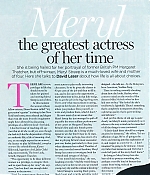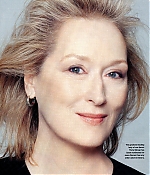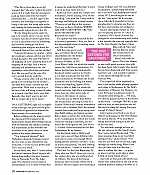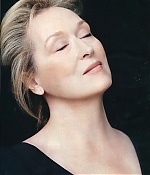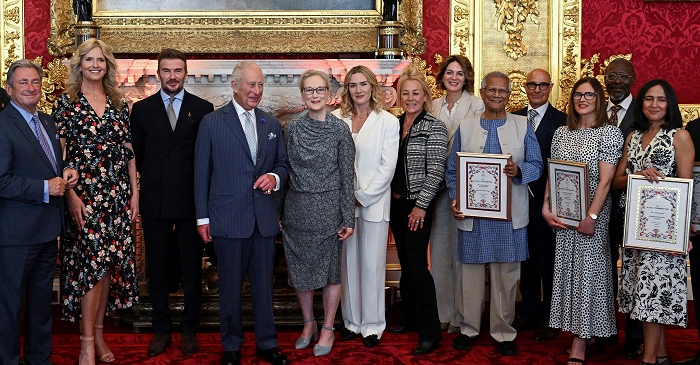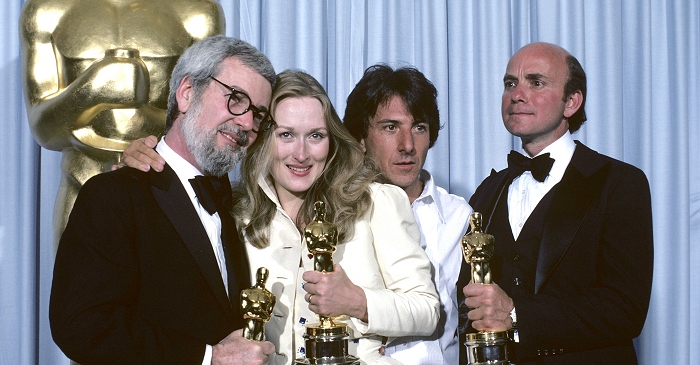|
Simply Streep is your premiere online resource on Meryl Streep's work on film, television and in the theatre - a career that has won her acclaim to be one of the world's greatest living actresses, winning three Academy Awards for "Kramer vs. Kramer", "Sophie's Choice" and "The Iron Lady". Created in 1999, Simply Streep has built an extensive collection over the past 25 years to discover Miss Streep's body of work through thousands of photographs, articles and video clips. Enjoy your stay and check back soon.
|
|
Meryl: The greatest actress of her time
Women's Weekly ·
February 2012
· Written by David Leser
|
|
Tags
|
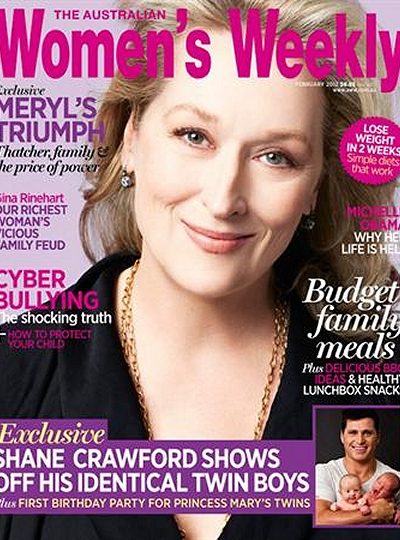
At this moment the woman whom fellow actress, Diane Keaton called “my generation’s genius” is sitting in her New York hotel room, more ethereal and elegant than even the most feverish imagination might have allowed for, discussing privileges of a different kind– her kind. Like the favour of reaching old age (not that at 62 she is old yet, even though she feels it.) Like the dispensation of living an authentic life, a life of meaning. And, yes, as you might expect for an actress, the license to play full-blooded, complex women like whistle blower, Karen Silkwood, legendary chef, Julia Child and, most recently, The Iron Lady, herself, Margaret Thatcher. “The opportunity to be these different women is a privilege, to imagine them and to open them up for view,” she says now. “And we don’t see enough older women in the movies. “I feel I’ve gotten more chances than most actors to play really interesting characters. So to be given the chance is 90 per cent of the job and then to fill it out, and to live up to the opportunity … that’s where I try to live, in that little wedge. But to get the job is the big, big thing now. There aren’t that many places in acting, except in the theatre, for your convictions unless you produce films yourself, or write and produce them, which I don’t.”
By now most of us are aware that Meryl Streep has just managed to pull off arguably the most sublime performance of her career as Margaret Thatcher, Britain’s first and only female prime minister, and that she is being widely tipped to win her third Oscar in 32 years. What we are, perhaps, less aware of is that in playing Britain’s most successful post-war leader, particularly in these years where dementia has robbed Thatcher of her once iron-clad mental faculties, Meryl Streep has come to investigate both the rewards and ravages of old age. “I see myself old everyday,” she says, laughing joyously. “And the weird thing is when you’re in the movies you see yourself young everyday and the contrast is shocking.”
Meryl Streep is wearing black pants, black boots and a purple gabadine jacket designed – she tells me – by the Malaysian-born American, Yeohlee Teng. There is nothing remotely shocking about how she looks. Rather, what comes to mind are the words of film director Mike Nichols when he first clapped eyes on her: “She looks like she’s swallowed a lightbulb. There’s something that’s completely transparent about her, a glowing quality that’s quite striking and delicate.” And yet this theme of old age is quite clearly on Meryl’s mind, particularly as it relates to the way a mind can be ransacked of all the things it once contained. “I don’t think there should be a stigma attached to dementia,” she offers. “It’s an affliction of age. We’re all going to be there, and entering into this exploration of it, and respect in a way for it … I don’t imagine I’m going to be immune. I mean my father had dementia and I felt that I could tell parts of the story that I knew.” In doing so Meryl Streep has also been able to portray something else, perhaps a terrible kind of beauty that comes from being reduced to nothing more than the present moment.
“This film is three days in an old woman’s life,” she says, “where the entire action of it is really that she manages to pack up these memories that maybe disoriented her … and live right in the moment, not working to an agenda or living in the past, but being right at the sink, hearing the birds, hearing the children, being exactly where she is in her life. “It’s the thing that actors aspire to, just to be exactly where you are. In the moment. And she (Thatcher) gets there. It’s not a big journey but it’s something that involves letting go and that’s something that intrigues me about the old people I know. How can they do that? “I always felt about my mother – when she would get a phone call that one of her friends had gone. She said `oh, they’re all stepping off now,’ meaning they’re all stepping off the edge. And it was so amazing and interesting to me, the equanimity with which she confronted that. She was sad, but she was alive every second that she could be. “Young women often will say `I’m not going to be anything like my mother,’ and then they reach a certain age and guess what? What they’re rejecting is the fact of the toll living a long life takes on a person. And they don’t want that. Basically, they don’t want to get old. But we all get old, if we’re lucky.
On a glittering night in Los Angeles seven years ago, the good and the great of Hollywood gathered to honour the finest actress of our generation. Before walking onto the stage to accept the American Film Institute’s lifetime achievement award, Meryl Streep had sat with her husband and children, blushing but resplendent, as she absorbed the accolades of her peers, many of them giants of the screen themselves. “You transcends talented,” Jack Nicholson observed, beaming toward his two-time co-star (Heartburn and Ironweed .) “To me you are perfect and I love you very much.” Shirley MacLaine, who, 13 years earlier, had played opposite Meryl Streep’s self-hating drug-addled character, Suzanne Vale, in Postcards from the Edge said: “The mystery of your talent is extraordinary. It is so other-worldy that it makes me understand that there is more in all of us than meets the eye.” Robert de Niro called her “unique and wonderful,” before adding, “You are the real thing.” And then Jim Carey took to the stage and bellowed in mock horror: “There is no bad film in this woman. There are no flaws. Nothing. WHERE ARE THE FLAWS? WHAT ARE YOU MAN? SHAPESHIFTER? BODYSNATCHER?” The uproar was only matched by the unanimous agreement – that, yes, here in this star-studded room of vaulting talent was “the real thing.”
And that was seven years ago, well before Meryl Streep shapeshifted into the hellcat fashion magazine editor, Miranda Priestley, in The Devil Wears Prada, for which she would receive her 14th Oscar nomination. Or before she bled into the ideologically-hardened mother superior in Doubt, a role that would earn her her 15th Oscar nomination. Or before she would transform into the hulking, but utterly joyous and beguiling, figure of Julia Child, in Julie and Julia, for which she would receive her 16th Oscar nomination, more than any other actor, male or female, in the history of cinema. Yes, this was all before that, before she would dance and sing her way to a Golden Globes and Grammy nomination for her role in Mama Mia, the musical comedy that would end up grossing more than US$600 million, her highest earning film to date; or before her performance in It’s Complicated, for which she would reveal her madcap underbelly, and for which she would garner the 24th of her 25 Golden Globes nominations for best performance by an actress. On that feted night in Hollywood seven years ago, all these defining roles were still to come, even though Meryl Streep, herself, seemed to doubt it. “I am so proud and grateful,” she said, bathing in the adulation. “I hope it’s not the end.” The End? Try the New Beginning. To those who saw Meryl Streep act, even in her earliest days, she was nothing short of brilliant. The dean of the Drama School at Yale University (where she’d earned a Masters degree after studying at Vassar College) said “she was destined for greatness.” Joseph Papp welcomed her to his New York Shakespeare Festival in late 1975, describing her as one of the few “true actors” he’d ever met. (As a child she’d pretended to be her grandmother by drawing age lines on her face, and wearing old cardigans.) Shortly afterwards, Robert De Niro saw her playing the role of a maid in Chekhov’s The Cherry Orchard. He thought she was mesmerising and, within a few months, she was cast opposite him in The Deer Hunter, the first of three films with De Niro, and the first film for which she would receive an Oscar nomination.
Meryl only took the part in The Deer Hunter so she could spend precious time with her then fiancee John Cazale who, despite having been diagnosed with bone cancer, had been cast – and wanted to appear – in this epoch-defining film on the Vietnam war. The couple had fallen hopelessly in love a year earlier while playing opposite each other in Shakespeare in the Park’s production of Measure for Measure. As actor Al Pacino would later recall: “I remember John telling me … `oh man, I’ve met the greatest actress in the history of the world.’ “I thought `well he’s a guy who’s in love, so how good can she be? She can’t be what he’s saying (but) sure enough it’s Meryl Streep.” John Cazale never lived to see his or Meryl’s performance in The Deer Hunter. He died in March, 1978, with Meryl taking leave from acting to nurse him to the very end. “He was lucky enough to have, as the last vision of his life, Meryl’s lovely face,” actor, James Woods, said. “The most amazing thing to see was Meryl during all this,” added Pacino. “The way she was with him by his side, right through the whole thing. When I saw that girl there with him like that … there is nothing like that … as great as she is in all her work, that is what I think of when I think of her.” And with all that pain still utterly raw, Meryl then auditioned for the role of the haunted Joanna Kramer, in Kramer vs Kramer, starring opposite Dustin Hoffman. “She came in (for the audition),” said Hoffman, “and after she left, there was some controversy because a producer said: `First of all, what is her name? Murel? She never opened her mouth, she didn’t say a word, she just sat there.’ “She was literally still in a state of mourning. (But) not only did I know she was a brilliant actress, it was a moment in her life when emotionally (she could draw on her pain.)”
Meryl ended up re-writing her lines for the court room scene in the film and then went onto win her first Oscar as best supporting actress, saying as she accepted the award “Holy Mackerel.” (She then went and left her Oscar on top of the toilet at the end of the ceremony! ) This was 1980, the true beginning. Two years later she would be nominated again for best actress in The French Lieutenant’s Woman. A year later she would win her second Oscar for her miraculous performance in Sophie’s Choice, where her Polish character Sophie Zawistowski (and yes she learnt to speak Polish for the role) is forced to make the most unspeakable choice of all – which child to hand over to the Nazis? Meryl had literally gone down on bended knees to beg director, Alan Pakula, for the part. “There is hardly an emotion that Streep doesn’t touch in this movie,” said Roger Ebert, the Pulitzer Prize-winning film critic, at the time. “And yet we’re never aware of her straining. This is one of the most astonishing and yet unaffected and natural performances I can imagine.” The films and the Oscar nominations kept coming, and in each film what we saw was not just a capacity for playing characters of remarkable depth, but a capacity for accents – English, Polish, mid-Western, Danish, New Zealand-Australian (as in Lindy Chamberlain) Italian-American, Bronx, you name it, she could do it. And through all this, she was also able to defy the Hollywood curse by finding happiness as a wife – to sculptor, Don Gummer whom she’d met a few months after Cazale’s death, a marriage James Wood was to describe as the “Great Love Affair of the the 20th Century. (The couple has four children – musician, Henry, actresses Mamie and Grace Gummer, and student, Louisa.)
“I am wired for family,” Meryl once said. She was also wired for investigating the human psyche like no other actress of our time. Now back from London where she took part in a special tribute night to British actress Vanessa Redgrave, as well as unveiled a poster of herself as Margaret Thatcher, Meryl admits to being unashamedly fascinated by the character she has just played. “She (Thatcher) was and remains in many quarters very hated for what she did with her policies in England. She’s also revered in other quarters for who she was and how she stood up for what she believed. “So it was the discrepancy that attracted me. Who is this person who was willing to – and could withstand – that level of venom? What kind of woman can stand up as a human being through years and years and years, decades, of hatred, and still maintain her convictions? It’s just interesting to look deeply into a life and find out where the human being is in there.” When it was first announced Meryl Streep was going to play the former British prime minister, you could almost hear the bells of indignation ringing out across the kingdom. How could an American, even a master of accents like Meryl Streep, capture the modulations and delineations of English speech? How could an actor with an instinctive liberal bent do justice to an instinctive conservative like Margaret Thatcher? And what would the family think given that Baroness Thatcher was now 86 years old and in the grip of dementia?
Would Meryl Streep be able to honour this woman who had overcome enormous obstacles of gender and class to lead her party to three general election victories in a row? Would she be able to show the grit and defiance of a woman who fought and won a war across the other side of the world – in the Falkland Islands – in the face of fierce criticism, both at home and abroad? Would she render accurately the steel and bloody mindedness of a leader who had literally torn up the economic consensus upon which Britain had been built since World War 11? Whether you like the film or not, the answer must surely be yes, yes and yes again. Not only has Meryl Streep ended up sounding and looking exactly like Thatcher did in her 40s, 50s and 60s, capturing all the poise, regal bearing and high certitude that were her hallmark. She – and here’s the uncanny bit – has also managed to achieve something else: a depiction, not only of the loneliness of power, but of, yes, the loneliness and desolation of old age. It is such a remarkable feat of empathy that I ask the iconic figure next to me whether she felt the need to defend Thatcher, in much the same way, perhaps, that she needed to defend the actions of Joanna Kramer, a mother who abandoned her son in the film Kramer vs Kramer? “Joanna Kramer needed defending,” she say now after a considerable pause. “With Thatcher, I didn’t think about defending her. She owns her place in history, fairly written in granite. But I did think about wanting to know what the toll was. I’m interested in older people because I feel myself getting older and I’ve always been interested in older people. I loved my grandmothers very much, and my mother, and I (was) interested in stories that lay in the layers behind that old lady’s (Thatcher’s) face.
“What are the costs to a woman of being in this position? What is the cost of that kind of life lived so ambitiously? Are there any regrets in it? Are there memories of glory that you can still take pleasure in? What’s it like to lose the power of concentration when you were somebody who could remember absolutely everything? How do we take leave of this life and how do people who have a big contentious life behind them, how do they reconcile to the simplicity at the end of life?” As Meryl is talking – every sentence glimmering with sparks of her own deep humanity – I am struck by how many characters I see before me now – the Danish plantation owner in Out of Africa (with Robert Redford); the unravelling wife in Kramer vs Kramer; the Italian mid-western wife in Bridges of Madison County (with Clint Eastwood); the author in Adaptation (with Nicolas Cage); the monstrous magazine boss in Devil Wears Prada; the concentration camp survivor in Sophie’s Choice (with Kevin Kline); the master chef in Julie and Julia; the dancing queen in Mama Mia, and now The Iron Lady herself. They are all here – a kaleidoscope of facial expressions and hand movements that all find wondereous form in this one woman. When asked what the hardest thing about playing Thatcher was, the actress actually stands up and hunches into a stooped position of ageing befuddlement, her face and frame suddenly turning ancient, as she slumps around the floor. “The hardest thing is standing like this for three months … because all I wanted to do was stand like this (assuming a ramrod straight back.)” And then there was getting the voice right. “She (Thatcher) had capacious breath. I am a trained actress. I have gone to drama school and attempted (Christopher) Marlowe’s `mighty line’ and understood that the best way to read a sonnet aloud is to start at the beginning and don’t take a breath because the breath is the thought that will carry onto the end of the line.
“But I couldn’t find where she (Thatcher) took a breath. I’m like this (gasping for breath). I can’t do this. I don’t know how she does it.” In playing Thatcher, Meryl Streep was surprised, make that awestruck, by the former British leader’s stamina, by the fact she cooked for herself and her husband every night, by the fact she slept only four to five hours a night and never dealt properly with health problems like her teeth. “I’m in awe of her. How, for eleven and a half years, to exist on that amount of sleep and make that many decisions? I’m not that way. I need to go away, `leave me alone, I need to go to sleep’ and have a big refurbishment. I need to listen to music. I need to read some poetry. I need to be by myself much more.” There is a deeply poignant moment in the film where Thatcher as an old woman is looking at a DVD of her twins, Mark and Carol, playing as young children on the beach. The former prime minister wonders aloud if it was all worth it, if she might not have spent more time with her children. Her husband replies: “You can rewind it, but you can’t change it.” Are there things then that she, Meryl Streep, would liked to have done differently? “Oh many things,” she replies coyly. Like what? “Never mind,” she replies, laughing like a squeaky schoolgirl. “But yes, everything is a decision. Everything is a choice. It comes down to that, the choices. You don’t even know if the choices you made were the right ones and the jury is out until your children have children. So it’s an ongoing anxiety. “But no, to me the reason to make the film was to look at the life of a big public person and then to morph it at some point into a story about you and me and all of us. How do we take leave of things? How do we reconcile ourselves to the cost of the choices we made in our life?”
And so now, finally, after 16 Oscar nominations (she hasn’t won since Sophie’s Choice in 1982), 25 Golden Globe nominations (7 wins); a slew of British Academy (BAFTA) Awards, Film Critics awards, Screen Actors Guild awards, People’s Choice awards, honorary degrees, the Order of Arts and Letters from the French Government, a Meryl Streep day named in her honour in New York … after all this, does she care for another award, perhaps her third Oscar? “I am very greedy (for more), she says, laughing not for the first time, but more than laughing – cackling, giggling, guffawing, squeeling, carolling, chuckling, gurgling all in one. To this slightly captivated outsider there appears such absence of vanity in the woman, such grace and exuberance, it’s no wonder that director, Mike Nichols once said to Meryl’s Silkwood co-star, Kurt Russell that “anyone who gets to know Meryl has to fall in love with her.” “What if they don’t?” Russell replied. Nichols said: “If they don’t, then there’s something wrong with them.”
There was nothing wrong with Kurt Russell, just as there was nothing wrong with Jim Carey on that Hollywood night seven years ago when he finished his uproarious tribute to the actress who rules the screen with these measured, holy words: “I just really want to say `God bless you (Meryl) as you have blessed us as He has blessed us through you.”


Posted on June 13th, 2025
|
Posted on May 18th, 2025
|
Posted on March 16th, 2025
|
Posted on February 24th, 2025
|
Posted on February 17th, 2025
|



